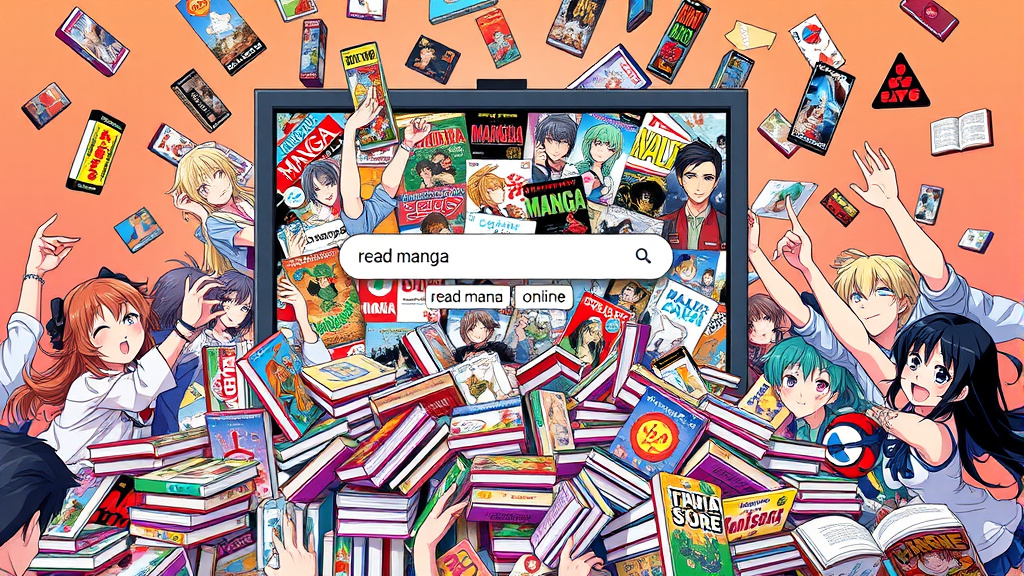manhwa us refers to the growing popularity and cultural integration of Korean comics (manhwa) within the United States. Over the past decade, the vibrant stories and unique artistic styles of manhwa have captivated American audiences, transforming from niche interests into mainstream entertainment. This phenomenon reflects broader shifts toward diverse storytelling mediums and the global exchange of art and culture. As more readers in the US discover the allure of manhwa, it influences everything from comic communities to digital publishing trends, marking a new chapter in cross-cultural media.
The Growing Popularity of Manhwa in the US Market
In recent years, manhwa has witnessed a significant surge in popularity across the US market. This increase stems from a combination of factors, including the rise of digital reading platforms, the influence of K-pop and Korean drama fandoms, and the expanding presence of Korean pop culture on social media. American readers are increasingly drawn to manhwa’s unique art styles, diverse genres, and serialized storytelling, which often diverge from traditional Western comics or manga. The accessibility of free or affordable translations online fuels widespread consumption, making manhwa a staple for many comic enthusiasts.
Moreover, the inclusion of manhwa in mainstream pop culture has helped solidify its standing within the American comics industry. Major publishers and digital platforms now feature dedicated sections for Korean comics, and events like comic conventions increasingly showcase Korean creators and their works. This expanding visibility not only broadens the reach of manhwa but also encourages collaborations between American artists and Korean authors, fostering an enriching cultural dialogue. As a result, manhwa’s presence in the US market isn’t just a fleeting trend but a sign of genuine cultural integration.
 Hình minh họa: manhwa us – read manga series
Hình minh họa: manhwa us – read manga seriesUnderstanding Manhwa: Key Differences from Manga for US Readers
To appreciate manhwa fully, US readers should recognize its distinctive characteristics compared to manga, even though both are Korean and Japanese comic forms, respectively. Manhwa is typically published in a horizontal or left-to-right reading format, aligning it more closely with Western comics. Its artwork often emphasizes expressive characters with a more modern, sleek aesthetic, and the storylines frequently explore contemporary themes and diverse genres that resonate with global audiences.
Additionally, the production process of manhwa can differ from manga's, often being released as webtoons—digital comics optimized for scrolling on smartphones and computers. This digital-first approach not only influences the pacing and panel layout but also makes manhwa more accessible for US readers who prefer instant, on-the-go entertainment. Understanding these differences helps US audiences engage more deeply with manhwa, appreciating both its artistic nuances and cultural context, ultimately enriching their comic-reading experience.

Top Manhwa Titles Gaining Traction in the United States
Certain manhwa titles have catapulted into mainstream awareness within the US, captivating diverse demographics with their compelling stories and vibrant artwork. Titles like “Solo Leveling” and “The Beginning After the End” exemplify this trend, blending fantasy, action, and character-driven narratives that appeal to fans of both Western and Eastern storytelling traditions. These series are widely available on popular platforms like Webtoon, Tapas, and Lezhin, further amplifying their reach.
Other titles such as “Lookism”, “Tower of God”, and “Noblesse” have also gained dedicated American followings. Their success is often attributed to their serialized nature and quality storytelling, which resonate particularly with younger audiences accustomed to binge-watching TV series or gaming. The popularity of these titles signals a shift toward more acceptance of manhwa as a legitimate and diverse form of entertainment in the US, encouraging publishers and creators to explore new genres and themes tailored to American tastes and sensibilities.
Navigating the Manhwa Landscape: A Guide for US Comic Enthusiasts
For American comic lovers interested in exploring manhwa, navigating the landscape can be both exciting and overwhelming. A good starting point is to identify trusted digital platforms that offer legal access to a wide range of titles. Websites like Webtoon, Manta, Lezhin, and Tapas host official translations, ensuring that readers support the artists and publishers directly. These platforms often feature user reviews, artist spotlights, and genre filters to help fans discover new favorites.
Beyond digital reading, engaging with online communities can enhance the experience. Reddit forums, Discord groups, and fan translations provide spaces for discussion, recommendations, and sharing of theories. While fan translations can expand access, supporting official releases is essential to sustain the industry and foster quality content. With these tools and community resources, US fans can immerse themselves in the vibrant world of manhwa and become part of its expanding global readership.
The Impact of Digital Platforms on Manhwa Accessibility in the US
Digital platforms have revolutionized the accessibility of manhwa in the US, turning what was once an almost niche interest into a mainstream phenomenon. Streaming services like Webtoon and Tapas offer free or affordable access to hundreds of titles, often updated multiple times a week. This immediacy satisfies the modern reader’s desire for instant gratification and keeps fans eagerly awaiting new chapters.
Furthermore, digital platforms democratize the publishing process for creators, enabling talented artists from all over the world to share their work directly with US audiences. This openness fuels diversity in genres and storytelling styles, showcasing everything from romance and horror to science fiction and history. As these platforms continue innovating with features like vertical scrolling, comment sections, and multimedia integrations, manhwa’s appeal in the US is poised to expand, fostering a truly global community of readers and creators.
Translating Culture: Challenges and Solutions in Bringing Manhwa to US Audiences
Translating manhwa for US audiences entails more than just converting words from Korean to English; it involves cultural localization, which can be complex. Certain idioms, social norms, humor, and historical references may not directly translate, risking alienating or confusing readers unfamiliar with Korean culture. This challenge requires skilled translators who can balance staying true to the original narrative while making it relatable for Western audiences.
Solutions include collaboration between cultural consultants and translators who deepen their understanding of Korean customs and societal nuances. Some publishers adapt the content further through rebranding or contextual notes, helping readers grasp cultural references without losing the story’s essence. As the industry recognizes the importance of cultural authenticity, future translations will likely become more nuanced, bridging the gap between Korean creators and American fans and fostering mutual appreciation for each other’s cultures.
The Future of Manhwa in the US: Trends and Predictions
Looking ahead, the future of manhwa in the US appears bright and poised for growth. Trends suggest increasing diversification of genres, with more titles exploring topics like LGBTQ+ themes, social issues, and complex characterizations beyond traditional romance or action. Technological advancements in digital publishing and augmented reality could create immersive experiences, further engaging readers.
Predictions also include more American and international collaborations, opening avenues for cross-cultural storytelling. The influence of K-pop, Korean dramas, and global fandoms will continue to fuel interest, and publishers might invest more heavily in marketing and translation quality. As awareness and appreciation for manhwa deepen, it will likely enjoy a status comparable to manga and Western comics, becoming an integral part of the global comic landscape.
Manhwa Creators and Publishers: Building Bridges with the US Comic Book Community
Creators and publishers are vital in fostering stronger ties between manhwa and the US comic book community. Many Korean artists are increasingly engaging with international fans through social media, live streams, and conventions, sharing their creative processes and cultural backgrounds. Publishers actively seek out collaborations, licensing agreements, and co-productions to introduce their works to new markets.
Building bridges involves not only translation and distribution but also cultural exchange programs, artist residencies, and joint projects. These efforts promote mutual understanding and appreciation, encouraging more American artists and publishers to explore Korean storytelling styles and vice versa. By nurturing these worldwide connections, the industry will foster a richer, more inclusive environment where diverse comic traditions can thrive and inspire global audiences.
Beyond Romance: Exploring Diverse Genres in Manhwa Available in the US
While romance remains popular among US audiences, the diversity in manhwa genres has expanded considerably. Today, readers can explore dark fantasy, thriller, historical fiction, slice-of-life, and even psychological dramas, reflecting the multifaceted nature of Korean storytelling. This diversification offers opportunities for US fans to discover new narrative styles and themes, breaking the stereotype that manhwa is solely romantic or fantastical.
Moreover, genre-blending stories are on the rise, with titles that mix elements of action, mystery, comedy, and horror. This trend not only caters to a broader demographic but also showcases the versatility of manhwa creators. As they continue to experiment with different genres, the US market will witness the emergence of innovative works that challenge conventional comic standards and appeal to diverse taste profiles.
Where to Read Manhwa Legally and Support Artists in the US
For US readers eager to support creators and ensure the sustainability of the industry, choosing legal platforms is essential. Reputable services like Webtoon, Tappytoon, Lezhin, and Manta offer official translations with transparent licensing agreements. Supporting these platforms through subscriptions, tips, and purchasing merchandise helps artists receives fair compensation and encourages the production of high-quality content.
Additionally, attending conventions, purchasing official merchandise, and engaging with social media channels further promote the industry’s growth. For readers seeking rare titles or premium content, investing in print editions or merchandise is an excellent way to support the artists directly. By prioritizing authorized sources, US fans contribute to a healthier manhwa ecosystem, ensuring that Korean creators continue to entertain and inspire audiences worldwide.
Conclusion
The rise of manhwa US reflects a dynamic shift in the global comic landscape, fueled by digital accessibility, cultural curiosity, and innovative storytelling. As American audiences deepen their appreciation for diverse genres and authentic cultural expressions, manhwa is poised to cement its status alongside leading comic traditions. Overcoming linguistic and cultural translating challenges, fostering collaborations between creators and publishers, and supporting legal distribution channels will be vital in sustaining this growth. Ultimately, manhwa’s cultural journey across the Pacific symbolizes the power of comics to bridge nations, inspire creativity, and celebrate storytelling in all its forms.




